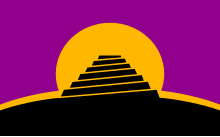User:LesVisages
|
 |
Language of the DayAfrihili (Ni Afrihili Oluga 'the Afrihili language') is a constructed language designed in 1970 by Ghanaian historian K. A. Kumi Attobrah (Kumi Atɔbra) to be used as a lingua franca in all of Africa. The name of the language is a combination of Africa and Swahili. The author, a native of Akrokerri (Akrokɛri) in Ghana, originally conceived of the idea in 1967 while on a sea voyage from Dover to Calais. His intention was that "it would promote unity and understanding among the different peoples of the continent, reduce costs in printing due to translations and promote trade". It is meant to be easy for Africans to learn. Afrihili draws its phonology, morphology and syntax from various African languages, particularly Swahili and Akan (Attobrah's native language). The lexicon covers various African languages, as well as words from many other sources "so Africanized that they do not appear foreign", although no specific etymologies are indicated by the author. However, the semantics is quite English, with many calques of English expressions, perhaps due to the strong English influence on written Swahili and Akan. For example, mu is 'in', to is 'to', and muto is 'into'; similarly, kupitia is 'through' (as in 'through this remedy'), paasa is 'out' (as in to go outside), and kupitia-paasa is 'throughout'—at least in the original, 1970 version of the language. The language uses the Latin alphabet with the addition of two vowel letters, ⟨Ɛ ɛ⟩ and ⟨Ɔ ɔ⟩, which have their values in Ghanaian languages and the IPA, [ɛ] and [ɔ]. Find out more... |
Did you know......that Adjuvilo, although it was a fully developed language, was merely created to help create dissent in the then-growing Ido movement? |
Did you know...
From Wikipedia's "Did You Know" archives:

- ... that the world's largest mathematical experiment, designed by Brian Butterworth, found women to be faster than men at subitizing?
- ... that Khmer numerals were the first material evidence of the figure zero as a numerical figure?
- ... that in the English plural, the letter -s is pronounced differently in words like "cats", "cabs", and "buses", because of a phonological rule?
- ...that the 2005 movie The Interpreter by film director Sydney Pollack was based on real-life conference interpreters from the United Nations Interpretation Service?
- ... that Samuel Taylor Coleridge spelled William Shakespeare's last name as "Shakspere"?
